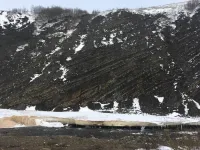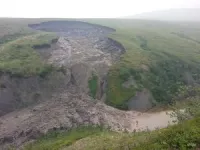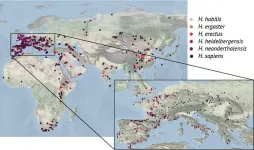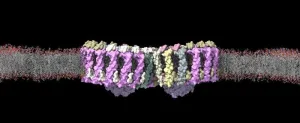(Press-News.org) Researchers from the Department of Earth Sciences at the University of Oxford have shown that weathering of rocks in the Canadian Arctic will accelerate with rising temperatures, triggering a positive feedback loop that will release more and more CO2 to the atmosphere. The findings have been published today in the journal Science Advances.
For sensitive regions like the Arctic, where surface air temperatures are warming nearly four times faster than the global average, it is particularly crucial to understand the potential contribution of atmospheric CO2 from weathering. One pathway happens when certain minerals and rocks react with oxygen in the atmosphere, releasing CO2 via a series of chemical reactions. For instance, the weathering of sulfide minerals (e.g., ‘fool’s gold’) makes acid which causes CO2 to release from other rock minerals that are found nearby. In Arctic permafrost, these minerals are being exposed as the ground thaws due to rising temperatures, which could act as a positive feedback loop to accelerate climate change.
Up to now, however, it has been largely unknown how this reaction will respond to temperature change and much extra CO2 could be released.
In this new study, researchers used records of sulfate (SO42-) concentration and temperature from 23 sites across the Mackenzie River Basin*, the largest river system in Canada, to examine the sensitivity of the weathering process to rising temperatures. Sulfate, like CO2, is a product of sulfide weathering, and can be used to trace how fast this process occurs.
The results demonstrated that across the catchment, sulfate concentrations rose rapidly with temperature. During the past 60 years (from 1960 to 2020), sulfide weathering saw an increase of 45% as temperatures increased by 2.3oC. This highlights that CO2 released by weathering could trigger a positive feedback loop that would accelerate warming in Arctic regions.
Using these past records from rivers, the researchers predicted that CO2 released from the Mackenzie River Basin could double to 3 billion kg/year by 2100 under a moderate emission scenario. This change would be equivalent to about half the total annual emissions from Canada’s domestic aviation sector for a typical year.
Lead author, Dr Ella Walsh (Department of Earth Sciences, University of Oxford at the time of the study) said: “We see dramatic increases in sulfide oxidation across the Mackenzie with even moderate warming. Until now, the temperature sensitivity of CO2 release from sulfide rocks and its main drivers were unknown over large areas and timescales.”
Not all parts of the river catchment responded in the same way. Weathering was much more sensitive to temperature in rocky mountainous areas, and those covered with permafrost. By modelling the process, the researchers revealed that sulfide weathering was accelerated further by processes which break rocks up as they freeze and shatter.
Conversely, areas covered with peatland showed lower increases in sulfide oxidation with warming, because the peat protects the bedrock from this process.
Co-author, Professor Bob Hilton (Department of Earth Sciences, University of Oxford) said: “Future warming across vast Arctic landscapes could further increase sulfide oxidation rates and affect regional carbon cycle budgets. Now that we have found this out, we are working to understand how these reactions might be slowed down, and it seems that peatland formation could help to lower the sulfide oxidation process.”
There are numerous similar environments across the Arctic where the combination of rock types, high proportions of exposed bedrock, and vast areas of permanently frozen ground create conditions where warming will result in rapid increases in sulfide weathering. As a result, it is extremely likely that this effect is not restricted to the Mackenzie River Basin.
According to the researchers, the study highlights the value of considering sulfide weathering in large scale emission models, which are extremely useful for making predictions of climate change.
*Records were provided by Environment Canada through their National Long-term Water Quality Monitoring Programme. Sulfate concentrations were measured using ion chromatography, where liquid samples are passed through a column filled with a resin which attracts specific ions based on their charge.
Notes to editors:
For media enquiries and interview requests, contact Dr Ella Walsh (ella.walsh@uib.no) and Prof Bob Hilton (robert.hilton@earth.ox.ac.uk).
The study ‘Temperature sensitivity of the mineral permafrost feedback at the continental scale’ will be published in Science Advances at 19:00 BST / 14:00 ET Wednesday 09 October. DOI 10.1126/sciadv.adq4893
For more information, including a copy of the paper, contact the Science Advances editorial team vancepak@aaas.org or access the Science Advances press package, VancePak, at https://www.eurekalert.org/press/vancepak/
Images relating to the study that can be used to illustrate articles are available: https://drive.google.com/drive/folders/1Vds06H6JeiQ6V5ML4IJsi299Y0_qsxpX?usp=sharing These are for editorial purposes only and must be credited. They must NOT be sold on to third parties.
Image 1: Landscape in the upper Peel River showing exposed bedrock on steep slopes coupled to river channels, where physical weathering is producing abundant fresh material (Credit: Robert Hilton)
Image 2: Thaw slump on the Peel Plateau, which exposes sulfide and carbonate minerals in glacial sediments to surface weathering reactions in lower slope regions with relict ice (Credit: Suzanne Tank)
About the University of Oxford
Oxford University has been placed number 1 in the Times Higher Education World University Rankings for the eighth year running, and number 3 in the QS World Rankings 2024. At the heart of this success are the twin-pillars of our ground-breaking research and innovation and our distinctive educational offer.
Oxford is world-famous for research and teaching excellence and home to some of the most talented people from across the globe. Our work helps the lives of millions, solving real-world problems through a huge network of partnerships and collaborations. The breadth and interdisciplinary nature of our research alongside our personalised approach to teaching sparks imaginative and inventive insights and solutions.
Through its research commercialisation arm, Oxford University Innovation, Oxford is the highest university patent filer in the UK and is ranked first in the UK for university spinouts, having created more than 300 new companies since 1988. Over a third of these companies have been created in the past five years. The university is a catalyst for prosperity in Oxfordshire and the United Kingdom, contributing £15.7 billion to the UK economy in 2018/19, and supports more than 28,000 full time jobs.
END
Scientists show accelerating CO2 release from rocks in Arctic Canada with global warming
2024-10-09
ELSE PRESS RELEASES FROM THIS DATE:
The changing geography of “energy poverty”
2024-10-09
A growing portion of Americans who are struggling to pay for their household energy live in the South and Southwest, reflecting a climate-driven shift away from heating needs and toward air conditioning use, an MIT study finds.
The newly published research also reveals that a major U.S. federal program that provides energy subsidies to households, by assigning block grants to states, does not yet fully match these recent trends.
The work evaluates the “energy burden” on households, which reflects the percentage of income needed to pay for energy necessities, from 2015 to 2020. Households with an energy burden greater ...
Why people think they’re right, even when they are wrong
2024-10-09
COLUMBUS, Ohio – If you smugly believe you’re right in a disagreement with a friend or colleague, a new study suggests why you may actually be wrong.
Researchers found that people naturally assume they have all the information they need to make a decision or support their position, even when they do not.
The researchers called it the “illusion of information adequacy.”
“We found that, in general, people don’t stop to think whether there might be more information that would help them make a more informed decision,” said study co-author ...
New study shows how muscle energy production is impaired in type 2 diabetes
2024-10-09
A new study from Karolinska Institutet, published in Science Translational Medicine, shows that people with type 2 diabetes have lower levels of the protein that breaks down and converts creatine in the muscles. This leads to impaired function of the mitochondria, the 'powerhouses' of the cell.
Creatine is a natural compound in the body that is also found in foods such as meat and fish. It is also a popular supplement for improving exercise performance as it can make muscles work harder and longer before they become fatigued. Despite creatine's ...
Early human species benefited from food diversity in steep mountainous terrain
2024-10-09
A new study published in the journal Science Advances [1] by researchers at the IBS Center for Climate Physics (ICCP) at Pusan National University in South Korea shows that the patchwork of different ecosystems found in mountainous regions played a key role in the evolution of humans.
A notable feature of the archeological sites of early humans, members of the genus Homo known as hominins, is that they are often found in and near mountain regions. Using an extensive dataset of hominin fossils and artifacts, along with high-resolution landscape data and a 3-million-year-long simulation of Earth’s climate, the team of scientists from ICCP have provided a clearer picture of how ...
Researchers discover new insights into bacterial photosynthesis
2024-10-09
Researchers at the University of Liverpool and collaborators have discovered new understanding of bacterial photosynthesis.
Using cutting-edge techniques, investigators have unveiled intricate detailed images of the key photosynthetic protein complexes of purple bacteria. These images shed new light on how these microorganisms harness solar energy.
The study, published today, not only advances scientists’ understanding of bacterial photosynthesis but also has potential applications in the development of artificial photosynthetic systems for clean energy production.
Like plants, many ...
Former United States Air Force surgeon general to lead Military Health Institute at UT Health San Antonio
2024-10-09
The University of Texas Health Science Center at San Antonio (UT Health San Antonio) announces the appointment of retired Lt. Gen. Robert Miller, MD, MBA, MSS, FAAP, FACHE, FACPE, as the new Executive Director of the Military Health Institute at UT Health San Antonio. Miller will assume his role, effective October 15.
Miller joins UT Health San Antonio with more than 30 years of service in the United States Air Force, where he held several top leadership roles. Throughout his distinguished career, Miller served as command surgeon, director of education ...
Journal of Nutrition Education and Behavior announces 2024 Best Article, Best Research Brief, and GEM Awards
2024-10-09
Philadelphia, October 9, 2024 – The Journal of Nutrition Education and Behavior (JNEB) is pleased to announce the 2024 Best Article, Best Research Brief, and GEM (Great Educational Material) awards. These awards were presented at the Society for Nutrition Education and Behavior's (SNEB) 2024 International Conference, held July 29 – August 1 in Knoxville, TN, and hosted online. These awards recognize the authors of the outstanding articles in each category published in the prior year in JNEB, as judged by members of the ...
NYU Tandon School of Engineering study maps pedestrian crosswalks across entire cities, helping improve road safety and increase walkability
2024-10-09
As pedestrian fatalities in the United States reach a 40-year high, a novel approach to measuring crosswalk lengths across entire cities could provide urban planners with crucial data to improve safety interventions.
NYU Tandon School of Engineering researchers Marcel Moran and Debra F. Laefer published the first comprehensive, city-wide analysis of crosswalk distances in the Journal of the American Planning Association. Moran is an Urban Science Faculty Fellow at the Center for Urban Science + Progress (CUSP), and Laefer is a Professor of Civil and Urban Engineering and CUSP faculty member.
"In general, lots of important data related ...
Louis V. Gerstner, Jr. family donates $25 million to establish Gerstner Scholars Program in AI Translation at Mayo Clinic
2024-10-09
ROCHESTER, Minn. — A $25 million gift from the Louis V. Gerstner, Jr. family will establish the Gerstner Scholars Program in AI Translation at Mayo Clinic. Through this program, junior and early-career clinicians and clinician-investigators will collaborate with leading experts in artificial intelligence (AI), data science and informatics to drive breakthrough cures for patients.
“We are deeply grateful to Lou and Robin Gerstner for their long-standing friendship and support,” says Gianrico Farrugia, M.D., Mayo Clinic's president and CEO. “Lou’s remarkable generosity over many years has been instrumental in ...
UTIA entomologist elected president of SIP
2024-10-09
Juan Luis Jurat-Fuentes, professor in the Department of Entomology and Plant Pathology at the University of Tennessee Institute of Agriculture, was elected to serve as president of the Society for Invertebrate Pathology (SIP). Jurat-Fuentes officially began his appointment at the society’s 56th annual meeting, held July 28 – August 1 in Vienna, Austria.
“Being elected by the SIP members as president is humbling and a great honor. I have big shoes to fill in this role as previous SIP executive councils were led by outstanding leaders,” Jurat-Fuentes said.
Jurat-Fuentes has a long history of ...





